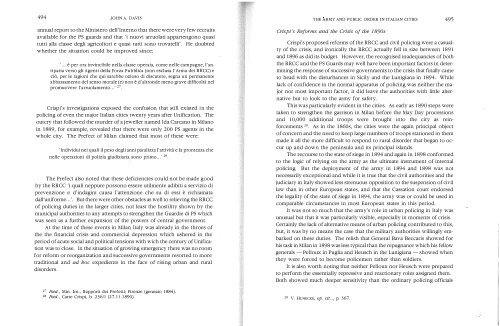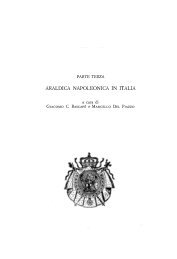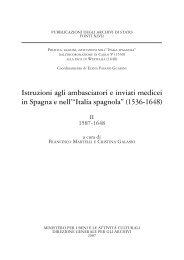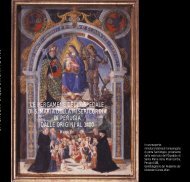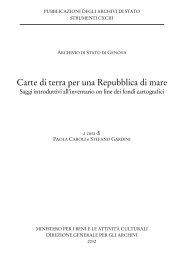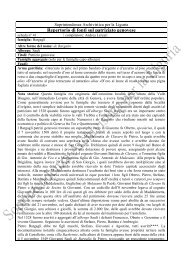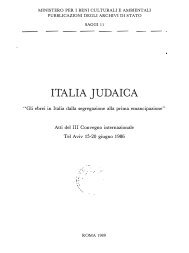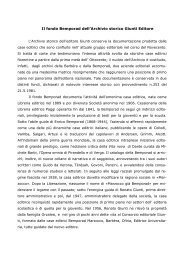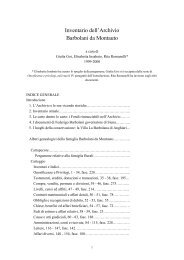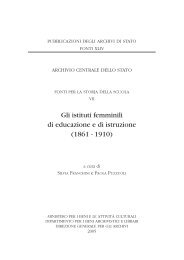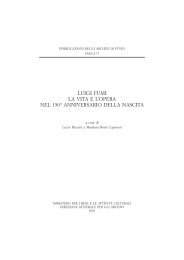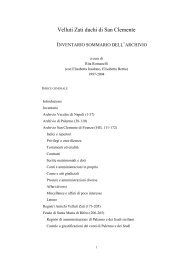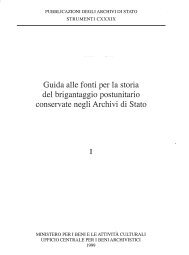esercito e città dall'unità agli anni trenta. tomo i - Sistema ...
esercito e città dall'unità agli anni trenta. tomo i - Sistema ...
esercito e città dall'unità agli anni trenta. tomo i - Sistema ...
Create successful ePaper yourself
Turn your PDF publications into a flip-book with our unique Google optimized e-Paper software.
494 ]OHN A. DA VIS<br />
annual report to the Ministero dell'Interno that there were very few recruits<br />
available for the PS guards and that 'i nuovi arruolati appartengono quasi<br />
tutti alla classe degli agricoltori e quasi tutti sono trovatelli'. He doubted<br />
whether the situation could be improved since:<br />
' ... è per ora invincibile nella classe operaia, come nelle campagne, l'antipatia<br />
verso gli Agenti della Forza Pubblica (non esclusa l'Arma dei RRCC) e<br />
ciò, per le ragioni che qui sarebbe ozioso di discutere, segna un permanente<br />
abbassamento del senso morale (e) non è d'altronde meno grave difficoltà nel<br />
promuovere l'arruolamento . .. ' 27.<br />
Crispi's investigations exposed the confusion that stili existed in the<br />
policing of even the major Italian cities twenty years after Unification. The<br />
outcry that followed the murder of a jeweller named Ida Carcano in Milano<br />
in 1889, for example, revealed that there were only 200 PS agents in the<br />
whole city. The Prefect of Milan claimed that most of these were:<br />
'Individui nei quali il peso degli <strong>anni</strong> paralizza l'attività e la prontezza che<br />
nelle operazioni di polizia giudiziaria sono primo . .. ' 28•<br />
The Prefect also noted that these deficiencies could not be made good<br />
by the RRCC 'i quali neppure possono essere utilmente adibiti a servizio di<br />
prevenzione e d'indagini causa l'attenzione che su di essi è richiamata<br />
dall'uniforme ... '. But there were other obstacles as well to relieving the RRCC<br />
of policing duties in the larger cities, not least the hostility shown by the<br />
municipal authorities to any attempts to strengthen the Guardie di PS which<br />
was seen as a further expansion of the powers of centrai government.<br />
At the time of these events in Milan Italy was already in the throes of<br />
the the financial crisis and commerciai depression which ushered in the<br />
peri od of acute social an d politica! tensions with wich the century of Unification<br />
was to dose. In the situation of growing emergency there was no room<br />
for reform or reorganization and successive governments resorted to more<br />
traditional and ad hoc expedients in the face of rising urban and rural<br />
disorders.<br />
27 Ibid. , Min. Int., Rapporti dei Prefetti; Firenze (gennaio 1884).<br />
28 Ibid., Carte Crispi, b. 236/1 (27.11.1890).<br />
THE ARMY AND PUBLIC ORDER IN ITALIAN CITIES 495<br />
Crispi 's Reforms and the Crisis of the 1890s<br />
Crispi' s proposed reforms of the RRCC an d civil policing were a casualty<br />
of the crisis, and ironically the RRCC actually fell in size between 1891<br />
and 1896 as did its budget. However, the recognised inadequancies ofboth<br />
the RRCC and the PS Guards may well have been important factors in determining<br />
the response of successive governments to the crisis that finally carne<br />
to head with the disturbances in Sicily and the Lunigiana in 1894. While<br />
lack of confidence in the normal apparatus of policing was neither the major<br />
nor most important factor, it did leave the authorities with little alternative<br />
but to look to the army for safety.<br />
This was particularly evident in the cities. As early as 1890 steps were<br />
taken to strengthen the garrison in Milan before the May Day processions<br />
and 10,000 additional troops were brought into the city as reinforcements<br />
29. As in the 1860s, the cities were the again principal object<br />
of concern an d the need t o keep large numbers of troops stationed in them<br />
made it all the more difficult to respond to rural disorder that began to occur<br />
up and down the peninsula and its principal islands.<br />
The recourse to the state of siege in 1894 and again in 1898 conformed<br />
to the logic of relying on the army as the ultimate instrument of internai<br />
policing. But the deployment of the army in 1894 and 1898 was not<br />
necessarily exceptional and while it is true that the civil authorities and the<br />
judiciary in Italy showed less strenuous opposition to the suspension of civil<br />
law than in other European states, and that the Cassation court endorsed<br />
the legality of the state of siege in 1894, the army was or could be used in<br />
comparable circumstances in most European states in this period.<br />
It was not so much that the army's role in urban policing in Italy was<br />
unusual but that it was particularly visible, especially in moments of crisis.<br />
Certainly the lack of alternative means of urban policing contributed to this,<br />
but, it was by no means the case that the military authorities willingly embarked<br />
on these duties. The relish that Generai Bava Beccaris showed for<br />
his task in Milan in 1898 was less typical than the repugnance which his fellow<br />
generals - Pelloux in Puglia and Heusch in the Lunigiana - showed when<br />
they were forced to become policemen rather than soldiers.<br />
It is also worth noting that neither Pelloux nor Heusch were prepared<br />
to perform the essentially repressive and reactionary roles assigned them.<br />
Both showed much deeper sensitivity than the ordinary policing officials<br />
29 V. HUNECKE, op. cit.,, p. 367.


